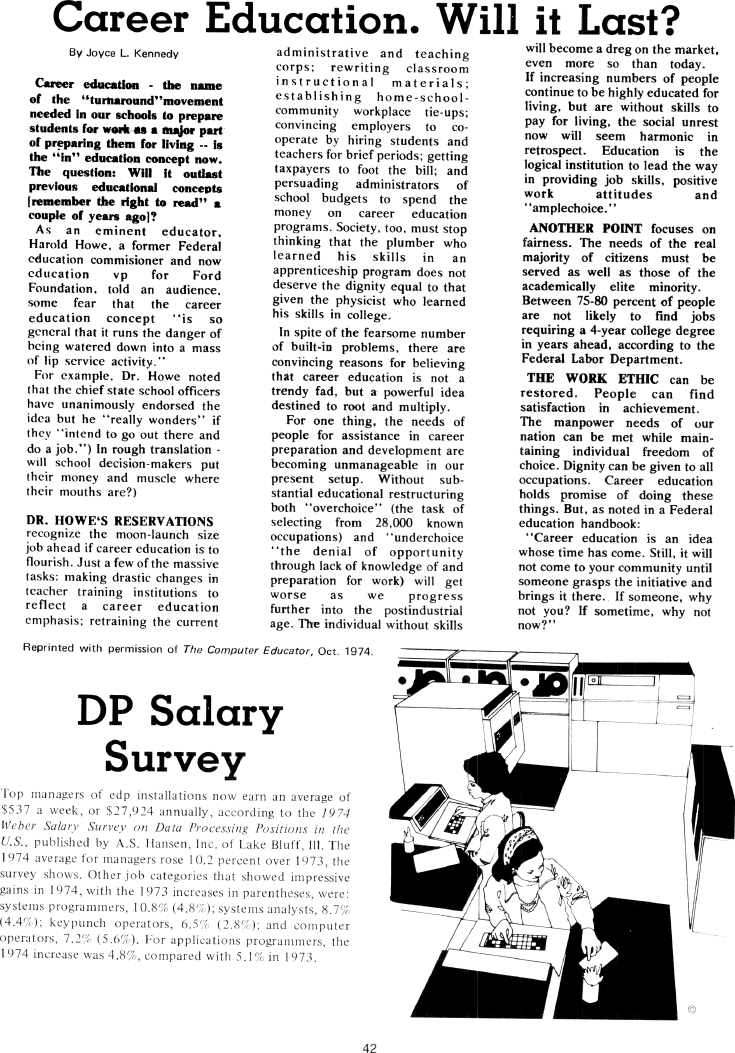The Best of Creative Computing Volume 1 (published 1976)
Career Education. Will It Last? (preparing students for work)

Career Education. Will it Last?
By Joyce L. Kennedy
Career education - the name
of the "turnaround" movement
needed ln our schools to prepare
students for work as a major part
of preparing them for living -- ls
the "ln" education concept now.
The questions Will lt outlast
previous educational concepts
[remember the right to read" a
couple of years ago]?
As an eminent educator.
Harold Howe. a former Federal
education commissioner and now
education vp for Ford
Foundation. told an audience.
some fear that the career
education concept "is so
general that it runs the danger of
being watered down into a mass
of lip service activity."
For example. Dr. Howe noted
that the chief state school officers
have unanimously endorsed the
idea but he " really wonders" if
they "intend to go out there and
do a job.") ln rough translation will school decision-makers put
their money and muscle where
their mouths are?)
DR. HOWER'S RESERVATIONS
recognize the moon-launch size
job ahead if career education is to
flourish. Just a few of the massive
tasks: making drastic changes in
teacher training institutions to
reflect a career education
emphasis; retraining the current
Reprinted with permission of The Computer Educator, Oct. 1974.
DP Salary
Survey
Top managers of edp installations now earn an average of
$537 a week, or $27,924 annually, according to the 1974
Weber Salary Surrey on Data Processing Positions in the
US., published by A.S. llansen_ Inc, of Lake Bluff, Ill. The
1974 average for managers rose 10.2 percent over 1973, the
survey shows. Other job categories that showed impressive
gains in I974. with the 1973 increases in parentheses, were:
systems programmers,10.8% (4.8%); systems analysts, 8.7%
(4.4%); keypunch operators_ 6.5% (2.8%); and computer the
1974 increase was 4_8%, compared with 5.1% in 1973.
administrative and teaching
corps; rewriting classroom
instructional materials;
establishing home-school-
community workplace tie-ups;
convincing employers to co-
operate by hiring students and
teachers for brief periods; getting
taxpayers to foot the bill; and
persuading administrators of
school budgets to spend the
money on career education
programs. Society. too. must stop
thinking that the plumber who
learned his skills in an
apprenticeship program does not
deserve the dignity equal to that
given the physicist who learned
his skills in college.
In spite of the fearsome number
of built-in problems, there are
convincing reasons for believing
that career education is not a
trendy fad, but a powerful idea
destined to root and multiply.
For one thing. the needs of
people for assistance in career
preparation and development are
becoming unmanageable in our
present setup. Without sub-
stantial educational restructuring
both "overehoice" (the task of
selecting from 28,000 known
occupations) and "underchoice
"the denial of opportunity
through lack of knowledge of and
preparation for work) will get
worse as we progress
further into the postindustrial
age. The individual without skills
42
will become a dreg on the market,
even more so than today.
If increasing numbers of people
continue to be highly educated for
living, but are without skills to
pay for living, the social unrest
now will seem harmonic in
retrospect. Education is the
logical institution to lead the way
in providing job skills, positive
work attitudes and
"amplechoice."
ANOTHER POINT focuses on
fairness. The needs of the real
majority of citizens must be
served as well as those of the
academically elite minority.
Between 75-80 percent of people
are not likely to find jobs
requiring a 4-year college degree
in years ahead, according to the
Federal Labor Department.
THE WORK ETHIC can be
restored. People can find
satisfaction in achievement.
The manpower needs of our
nation can be met while main-
taining individual freedom of
choice. Dignity can be given to all
occupations. Career education
holds promise of doing these
things. But, as noted in a Federal
education handbook:
"Career education is an idea
whose time has come. Still, it will
not come to your community until
someone grasps the initiative and
brings it there. If someone, why
not you? If sometime, why not
now?"


